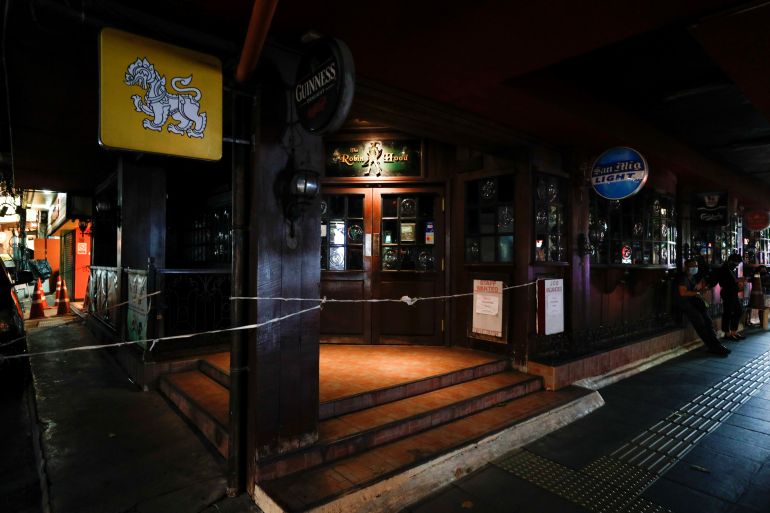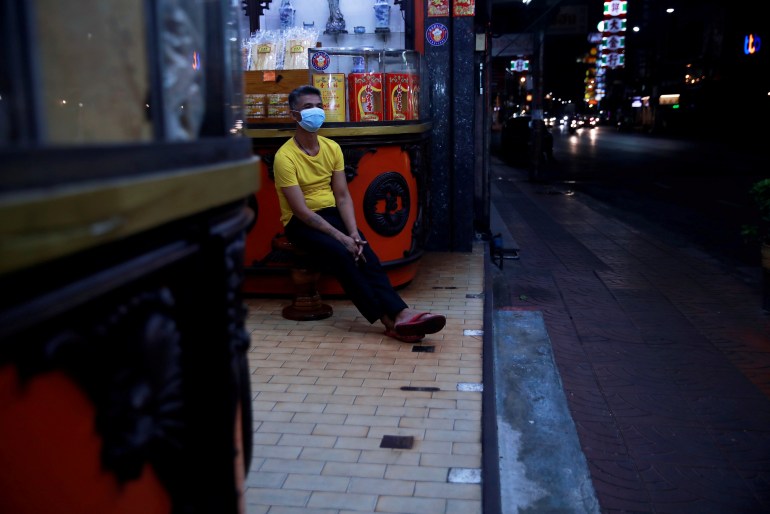In Thailand, Myanmar exodus a lifeline for COVID-battered economy
Undocumented migrants are filling labour shortages in Thailand as the economy rebounds from the worst downturn since 1997.

Bangkok, Thailand – For Sithu, the nightly choice is simple: risk arrest for working illegally in a Bangkok restaurant or return to penury in Myanmar.
He is among a shadow army of undocumented workers staffing hospitality, construction sites, farms and factories in a Thai economy that has been crushed and starved of authorised migrant labour by the pandemic.
Keep reading
list of 4 itemsAs North Korea’s economy flounders, hints of easing isolation
China’s economy bests expectations amid property market fears
For China, reining in real estate is a high-stakes balancing act
The kingdom, still Southeast Asia’s second-largest economy despite last year suffering its worst contraction since 1997, is trying to reboot after a draining battle to control COVID-19.
To do so, it urgently needs hundreds of thousands of cheap manual labourers from neighbouring Myanmar, Cambodia and Laos.
But sourcing such labour during a pandemic is complicated, with fears uncontrolled migration may lead to a surge in COVID cases that ultimately forces the country to close down once more.
That has left many businesses running on migrants who have waited out the virus in Thailand – or those who have slipped over the border illegally.
“We don’t have documents and we’re too afraid to register now in case we are thrown out,” Sithu, a Myanmar national working illegally at a downtown Bangkok restaurant, told Al Jazeera.
Sithu, who gave only one name to protect his identity, and his compatriot colleagues have been repeatedly arrested by police over the last few months for working at a business which runs outside its licensed hours. But most return to work the next day after the restaurant owner pays a “fine” for their release.
“Thai business owners will take anyone now – legal or illegal – they have no staff, they are desperate,” Sithu said.

Thailand had 2.3 million officially registered migrant workers – the majority from Myanmar – as of November last year, when authorities sought to regularise labour amid the pandemic, according to the International Labour Organization.
But observers say the number of unofficial workers is likely to be much higher, part of an underground labour force that keeps the economy ticking.
“Almost all of the workers currently in the agriculture sector are undocumented,” Tanat Sorat, vice chairman of the Employers’ Confederation of Thai Trade and Industry, told Al Jazeera. “There are around 700,000 to one million migrant workers in that sector alone.”
Scores of Myanmar nationals are being caught each day entering illegally through the forests and fields of Kanchanaburi, located on Thailand’s western border with Myanmar, or from the port of Dawei, walking over the mountains into the southern province of Prachuap Khiri Khan.
Observers say the trickle of arrested Myanmar nationals paraded on TV by local police conceals a torrent abandoning Myanmar, self-exiles from an economy upended first by the coronavirus and then a February coup.
“Look around you on the streets, thousands are making it through every day,” Myint Thun, a representative for advocacy group Labour Protection Network (LPN), told Al Jazeera.
“The situation in Myanmar since the coup is so bad that people have to come here. They know they won’t starve in Thailand even with a bad job. That’s not true anymore in Myanmar.”
Thailand’s economy is projected to grow by 1.2 percent this year, after a 6.1 percent contraction in 2020, according to data from the Office of the National Economic and Social Development Council.
Household debt is soaring, employment is at its highest in a generation and the government has borrowed a record $45bn to revive the economy. But to post even a modest rise in the gross domestic product (GDP) this year, Thailand needs its overseas labour to return.
The country’s fast-ageing society is shedding workers, while the lowest-paid jobs commonly occupied by migrants now hold little appeal to Thais.
Under-the-table payments
Labour Minister Suchart Chomklin has flagged the orderly return of migrants through official borders “so employers and business operators have sufficient employees to drive the economy while eliminating the illegal immigration problem”.
From the end of this month, the plan is to allow Thai business owners to apply for permission to bring in workers on condition they pick up the tab for COVID testing, up to 14 days quarantine depending on the vaccination status of the workers, insurance and visas.
But at a cost of up to $660 per worker, such procedures are too onerous for small businesses.
“Those rules only make sense for large-sized industries who can afford it,” said Tanat, the vice chairman of the Employers’ Confederation of Thai Trade and Industry.
Meanwhile, Myanmar – the source of most of Thailand’s foreign workforce – may face logistical and security problems issuing passports and travel documents.
The military government which seized power in February is facing rebellion across the country, especially in the border areas dominated by ethnic groups that make up the bulk of Thailand’s workers.
“Myanmar’s government might think that these people have links to the rebels … it’s up to them now to work it out,” Tanat said.
If you don’t have papers they’ll accept you too
While governments wrangle over the small print, a scroll through jobs pages on Facebook hints at the rules of supply and demand inside the kingdom’s labour market.
“Work in a strawberry farm for 1200 THB/day [$36],” read one recent advertisement. “We accept all nationals: Thai, Laos, Myanmar.” Another called for “honest and hardworking” gardeners, adding “if you are unregistered, we will help you”.
Thailand’s ranks of shadowy employment brokers are also back in business and busy pushing job advertisements in Myanmar migrant community groups.
“Looking for large numbers of Myanmar men to work in a factory,” said one November 20 post, “passports only will suffice.” Another post described a barbecue pork restaurant in need of three Myanmar nationals that offered free food and board, providing the reassurance that “if you don’t have papers they’ll accept you too”.
The scale of demand means the majority of migrants caught for illegal entry are not being deported but instead spun back into the labour force with the help of under-the-table payments, according to one Myanmar broker based in the fishing port of Samut Sakhon.
Thai companies are paying brokers approximately $100 per construction worker and $15-20 for factory staff they can get into the country.
“I’m getting calls every day, construction sites need 300-500 workers … and they will take undocumented people as well, they have no choice,” the broker said, requesting anonymity.